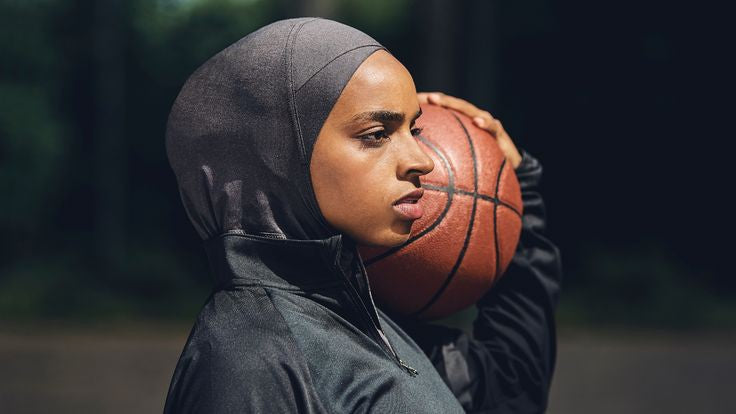Breaking Barriers: Meet the Hijabi Sportswomen Changing the Game
Islam is a faith that heavily promotes modesty and humility. It urges believers to dress in a manner that conceals their beauty while also commanding them to lower their gaze when encountering a non-mahram. One key way Muslims women practice these teachings is by the implementation of hijabs. Hijab, though it is of numerous types, are primarily referred to as a scarf wrapped around the head, covering the hair, neck and ears while leaving the face visible.
Christianity, Judaism and Islam are just a few of the religions that promote its believers to practice modesty. Historically, modesty was looked upon as a status symbol while today, modesty is understood to be deeply connected to faith. It encompasses internal purity and humility, externally expressed through modest behavior and attire.
The negative reputation hijabs often receive is fortunately not how Muslim women perceive or define them. Contrary to popular belief, the hijab is a garment worn proudly by muslim women as a form of self expression and source of empowerment. They choose to flaunt the garment with pride while showcasing their religious identity.
As the Muslim population continues to grow, the world continues to witness the rise of Muslim men and women in all aspects. With the structure of the system, it is quite easy for women to face prejudices, add along religious bounds, and being sidelined in the workplace has become a norm.
Nevertheless, women have consistently adapted and carved out their place within the system. This can easily be observed by numerous strong, capable women excelling in their field and advocating the rights of fellow Muslimahs. Let’s pay homage to their efforts and countdown and list of some of the most influential and impactful Muslim Hijabi Sports Women.
Ibtihaj Muhammad

Starting it off with none other than, Ibtihaj Muhammad. Arguably the most impactful Muslim woman in the field of sports. Ibtihaj Muhammad is an African-American Olympic Fencer. Being born and brought up in New Jersey, Ibtihaj represented the United States in the 2016 Summer Olympics during which she attracted significant media attention for being the first Hijabi to represent the United States in the Olympic games. Ibtihaj successfully earned herself a bronze medal after defeating Italy and solidified her position as the first ever black woman to win an Olympic medal in the Sabre event. Ibtihaj joined the US National Fencing team in 2010 and by 2017 she was ranked as top 2 in the US and top 7 in the world.
Born into the religion of Islam due to her parents' conversion, Ibtihaj spent all her life advocating for Muslims, and by 2014 along with her siblings, successfully launched a modest clothing company.
Lastly, inspired by Ibtihaj, Mattel introduced the first ever fencer doll and a hijabi doll, included in the line of female role model Barbies introduced as part of their International Women’s Day Campaign back in 2017.
Asma Elbadawi:

Asma Elbadawi is a Sudanese-British Basketball player best known for her contribution in overturning the FIBA ban on headgear. Elbadawi, though born in Sudan, migrated to Bradford, West Yorkshire along with her family in her early years. She began playing Basketball in university while acquiring a bachelor's degree in photography.
In late 2014, The International Basketball Federation (FIBA) initiated a revision process on a 20 year ban they had in place on religious headgear. According to the FIBA, the ban was imposed due to safety reasons and fear that “players could slip on headgear that fell to the ground”. The ban was a prohibition of any headgear wider than 5 inches, which effectively excluded women wearing hijabs from participating. Obviously, this rule faced extensive criticism by different religious groups. As a result, Asma petitioned the FIBA to overturn this ban in court and was able to garner a total of 130,000+ online signatures. After 2 years of court battles and campaigns, Asma and her friends were able to make the FIBA reverse their ban. Successfully making it accessible for veiling women, of any religion, to play basketball professionally.
Manal Rostom:

Last but not least, let’s talk about the achievements of Manal Rostom. The professional Egyptian-American marathoner, mountaineer and activist has garnered herself a reputable rank in her field of work. Being named “Africa’s top 50 most powerful women” by Forbes Africa, Manal is the first Hijabi woman to participate in the Nike Running Campaign which then expanded to her becoming the Global face of Nike Pro Hijab.
Manal was also the first woman to run The Great Wall of China Marathon in May 2016 and became the first-ever Egyptian woman to climb to the top of Mount Everest.
Additionally, Manal is the founder of the renowned Facebook Group, by the name of Surviving Hijab. The group is an 800,000+ women's only group that helps defy stereotypes and empower women who wish to wear the hijab as a sign of their faith. The group has gained massive popularity and been awarded Facebook’s Community Leadership Fellowship award by Facebook as one of the largest groups on Facebook currently present to shatter stereotypes and support minorities.
The achievements of these highly influential sports women clearly showcase their significant impact on the world and their relentless fight for Muslim rights, serving as a powerful source of inspiration for young women. Their empowerment journey is remarkable, especially as they accomplished it all while proudly embracing their hijabs and religious identity.

If you are someone who is also interested in embarking on the hijabi journey, there are some essentials that would aid in making the adjustment a lot more easier. Or if you are already someone who dons the religious garment and would like to level up on your accessories, then the hijab magnets are for you!
References:

Share:
Your Guide to the Perfect Summer Hijab Fabrics
The Art of Forgiveness in Islam: Letting Go and Moving Forward